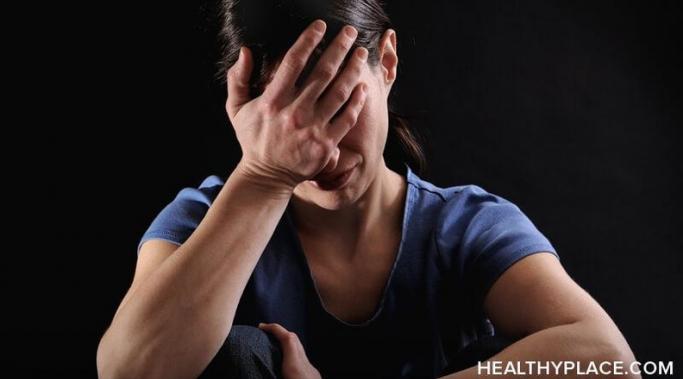Do you think you can deal with bipolar disorder alone? Do you think you can keep your bipolar a secret and just do what it requires by yourself? If so, you're not alone. Many people try, sometimes for years, to handle bipolar disorder alone. They do Google searches and online research about bipolar and its treatments and somehow that makes people think they can do it on their own. But I have news for you: you can't deal with bipolar disorder alone.
Myths - Breaking Bipolar
There is this myth of a "nervous breakdown." We see this term in news report, press releases and even in our own families -- "Oh, you know Aunt June? She suffered a nervous breakdown." But what are people talking about when they say someone had a nervous breakdown. Clearly, something happened but the truth of the matter the idea of a "nervous breakdown" is a myth.
I am a person with extreme willpower and this helps my mental illness. I know this. It’s obvious. Willpower affects every aspect of my life, of course. But people may think I have no willpower because of my mental illness. This is because people overestimate how much willpower can help a mental illness.
It is being widely reported in the media that Orlando shooter Omar Mateen had bipolar disorder, but do we really know if Mateen had bipolar disorder (What Is Bipolar Disorder)? Where did this information come from and should we really believe it or is it just media sensationalism? After all, every mass shooter seems to be designated some mental illness; is it just bipolar’s turn?
Mindfulness doesn’t help my bipolar disorder. I’m sorry; I know advocates aren’t supposed to say that kind of thing. I know we’re all supposed to get behind the new, fashionable therapies and tell everyone to do them (but heaven forbid we do the same with psychiatry) but this is one that I think has some major holes in it, particularly for people with serious mental illness. Please understand, mindfulness as a therapy might work for you but here’s why mindfulness doesn’t help my bipolar disorder at all.
Twice lately I have heard people say that the secret to curing depression is just keeping yourself wickedly busy. If you’re busy enough, they say, you’ll have no time to be depressed. (I didn’t realize that one needed to book an appointment for depression.)
This, of course, is absolutely hogwash and just one of the dumb ideas that people with no experience with major depression have. It’s just one of the ideas we have to politely roll our eyes at and then get on with the business of actually treating our depressions.
Bipolar moods vary in duration by person but typically, an untreated bipolar mood can last months or even years. All a bipolar disorder diagnosis requires is the presence of one manic/hypomanic mood episode and one depressed mood episode. This means that a person could be in a year-long depression and have only experienced one week of mania, a year ago, and still qualify for a bipolar diagnosis.
This is much to the surprise of many as there is a pervasive belief that bipolar disorder is about frequent “mood swings.” However, simply “being moody” is not indicative of bipolar disorder.
I wish someone had asked me before naming a class of drugs “antipsychotics.” I mean, I understand that to psychiatrists it might not be a big deal, but to the medication-taking public out here, let me just say that the stigma around medication is about 10-fold when you say you’re on something called an “antipsychotic.”
Tell someone that you’re on “antipsychotics” sometime and watch them back away slowly. I’m not kidding. It’s like they think an axe is about to magically materialize and you’re about to use it to chop off their head.*
We’ve all heard it – the condescending notion that bipolar disorder, depression or another mental illness is “all in our heads.” This is the notion that we are not ill and that we simply think we are ill. If we stopped believing we had a mental illness, we would stop having one. Naturally, this is hogwash. But science and medicine can’t seem to convince people out of this illogical notion (Denial Keeps Those with a Mental Illness From Getting Better). I think that’s because people have their own psychological reasons for wanting to believe that mental illness is “all in our heads.” Mostly, it’s fear.
One of the challenging things about being a person with a mental illness who talks about psychiatry (and doesn’t hate it) is that all those people who do hate psychiatry perk up and get mad. These people often identify as “antipsychiatrists” and I’m not their biggest fan. While I consider it quite reasonable to question your doctor, psychiatrist, treatment, therapist and other treatment aspects, I consider going after an entire branch of medicine ridiculous. There is no “antioncology” faction in spite of the fact that a large percentage of people with cancer die (depending on the type, of course).
And this manifests in many of our lives. It’s not that antipsychiatrists just attack me; it’s that people of that mindset attack your average person who is just trying to deal with a mental illness. It’s the people who say, “mental illness doesn’t really exist” or “psychiatric medicine doesn’t work” or many other things that many of us hear online and in our real lives all the time.
So how do you talk to these people who have decided that your disease doesn’t exist and you shouldn’t be in treatment?









![MP900285007[1]](/sites/default/files/styles/blog_listing/public/uploads/2012/06/MP9002850071.jpg?itok=jA3ISj4_)